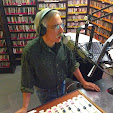In 1963, guitarist Nicolas Kasanda "Docteur Nico" and singer Tabu Ley "Rochereau" left Joseph Kabasele's African Jazz to form a new group, African Fiesta. Nico and Rochereau would soon split and go their separate ways. The bands of Docteur Nico, Tabu Ley and Franco (OK Jazz) were the at the very top of the music scene in Zaire in the 1960s.
In the 1970s, Tabu Ley and Franco went on to enjoy enormous sucess. Docteur Nico disappeared from the music scene due to a number of personal and professional downturns and disappointments.
In the 1970s, Tabu Ley and Franco went on to enjoy enormous sucess. Docteur Nico disappeared from the music scene due to a number of personal and professional downturns and disappointments.
In 1980, however, Docteur Nico, "le Dieu de la Guitare", reappeared on the stage in Kinshasa with Tabu Ley and his Afrisa International. Nico worked for a year or so with Tabu Ley. Our first song here is from an album SEIGNEUR TABU LEY ET L'AFRISA INTERNATIONAL : ROCHEREAU VOL. 4.  Docteur Nico is pictured prominently on the album's back side.
Docteur Nico is pictured prominently on the album's back side.
 Docteur Nico is pictured prominently on the album's back side.
Docteur Nico is pictured prominently on the album's back side.
The first song in the file accessible below is, appropriately, RESURRECTION, penned by Nico Kasanda himself.
In 1981, Nico left Rochereau again to pursue and record music in his own direction.
He made a few records in Paris with saxophonist Empompo Loway and singer Vonga Aye, two of which are pictured here.
The songs presented here from these albums are SUKI SA from Vonga Aye's album and BONINGA from the other. Although the singer on SUKI SA is Mayos and not Vonga Aye, I have chosen this song because Nico's superb guitar skills are featured so well.
In 1982, Docteur Nico joined up with Les Redoutables of Abeti. Two years later, he recorded some songs in Brazzaville on the I.A.D. label. 34 ANS BA SOLOS ELEKI (IAD/S 0017) may be one of the albums produced at that time.
From this album, please listen to ADIKANDE, a truly wonderful track and one of my favorites from his later period.
In 1984, Dr. Nico recorded an interesting album on the Kina-Rama Selection label with Franck Lassan. It includes four songs, two extended rumbas and two rather quirky ballads that seem reminiscent of French cafe-style love songs.
From this album, I have included one of the rumbas, VEMPOL.
Nico Kasanda went to Togo with his brother, rhythm guitarist Dechaud, in the mid-80s, making the album pictured below that includes the song LA VIE C'EST UN COMBAT, a song that unfortunately may be a snapshot into his own life.
Nico continued to work with Les Redoutables, touring Africa, and eventually made a couple of albums in the United States. The albums pictured below, recorded in 1985, the year of his sudden and tragic passing, are among his last recordings.

From AUX USA, we have AIMONS LES VIEUX and from his marvelous and appropriately named swan song, ADIEU, please listen to LA ROU QUI TOURNE. The wheel turns for us all. Docteur Nicolas Kasanda had a truly personal style that is instantly recognizeable to many. His work has influenced many and has been a major factor in my love for Congolese music.
Please download this file to hear the songs.
Your comments are always welcome.







Thank you for letting us hear this immortal music!
ReplyDeleteThank you DavidN, for all you music.
ReplyDeleteI remind my friends Colombians with the song "RESURRECTION" of Tabu Ley and also has a song called Ponce Pilate also very appreciated,
Thank you,
Fabian -
Thanks Fabian.
ReplyDeleteYes, as you see from Rochereau's album cover, PONCE PILATE is also on the record. This is a different longer version, over 11 minutes, than on the later CD.
Hailed throughout Africa as "le Dieu de la Guitare," Nicolas Kasanda was born of Baluba parentage on 7 July 1939 in Mikalayi in the Kasai province of the then Belgian Congo. His father played accordion. In 1950, aged 11, Nico was introduced to Opika Studios by his cousin Tino Baroza and older brother Mwamba Déchaud who were session musicians there. At 14, he joined Joseph Kabaselle's African Jazz. In 1957 he took up electric guitar and can be heard playing electric guitar on 'Sophie ya motema,' recorded in 1960. In 1961 he temporarily split with Kabaselle and formed African Jazz Aile Nico before returning to Kabaselle in 1962 and 1963. (Vincent Luttman cautions that some of the early Surboum African Jazz recordings of this period thought to be featuring Nico are played by Tino Barozo. Luttman also points out, very perceptively, that Nico's later signature choppy guitar style when he is chording behind a vocalist, is based on Manu Dibango's piano technique: which was his own unique version of the montuno piano style he brought to collaborations with Kabaselle.) Young Nicolas Kasanda graduated with honours from high school and went on to college, while keeping his night job as Leopoldville's hottest young guitarist. He taught auto mechanics at the Christian Brothers school in N'djili district, Kinshasa, which earned him the nickname 'Docteur.'
ReplyDeletedoc nico have take his popularity in his novation of style ; the most important is to have restore whith the hofner fender guitar the sonority of the traditional sanza likembé .
A talent which made say has jimi hendrix that doc nico is one of it's major reference
thanks you david for your nice blog
Thanks for your support. What is your source for this quote?
ReplyDeletethe source of the quote is muzikifan website
ReplyDeletehttp://easyjams.blogspot.com/2010/09/zaire-volume-2-kinshasa-united-artists.html
ReplyDelete